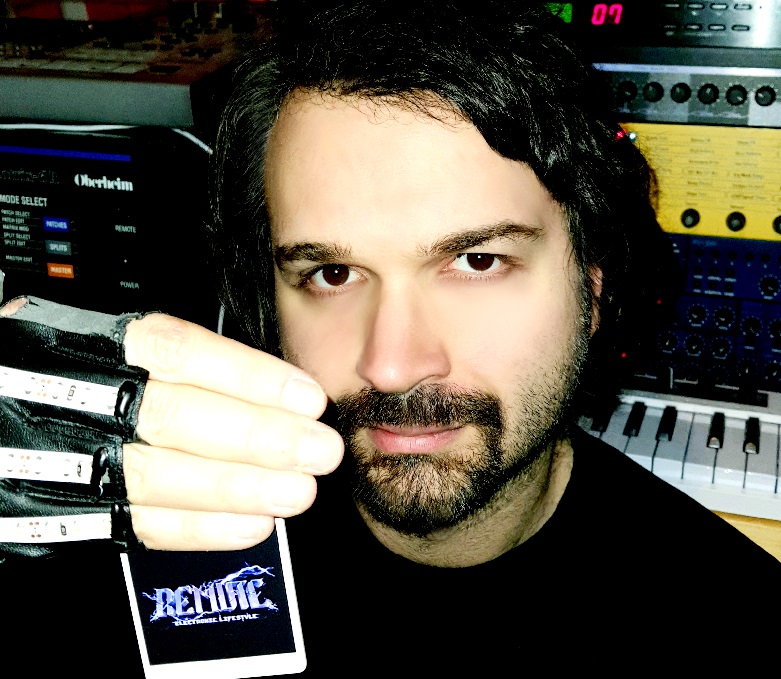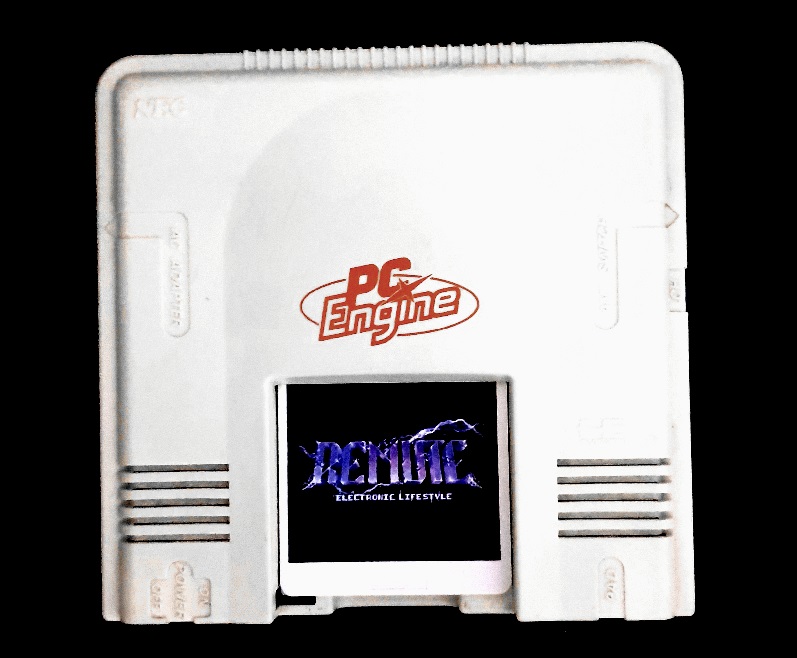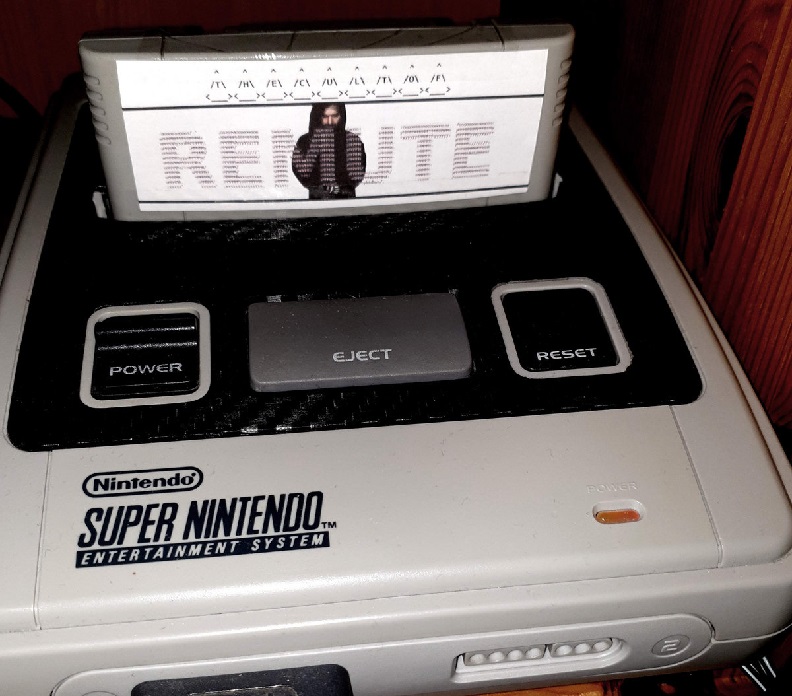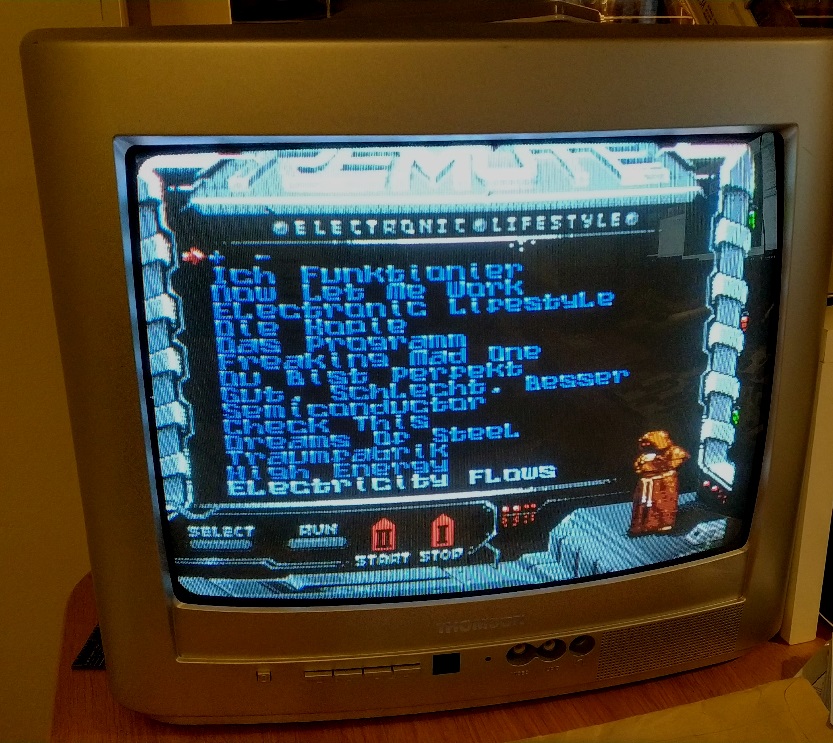Interview with musician Remute (translation)
[If you prefer to read this in German, click here to read the original version of this interview]
Recently I managed to find something great on the net. It was about a musician who releases his albums not on conventional media, but on game modules, Game Boy, PC Engine and Super Nintendo. Shortly googled, turned on youtube, mashed the music into my skull – and directly wrote to him. The exchange was quick and uncomplicated and I’m especially glad about this rather unusual interview partner, because what Remute does and is able to, not many are able to do nowadays.
Interview
Tell the readers briefly, in your own words, who you are and what exactly you do musically and moreover.
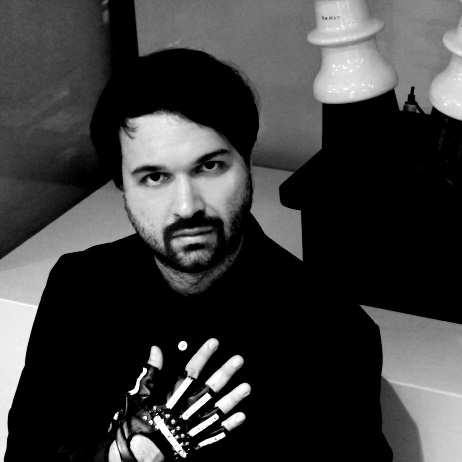
My name is Remute. I’m from Hamburg (Germany) and have been releasing electronic music since 2002. After years of work in the techno scene, releases and albums on well-known labels like Tresor Records and worldwide concerts at places like Mayday, Awakenings, Berghain or the Fusion Festival, I felt the need to „reinvent“ myself as a musician in 2019 – as it is after decades of activity. And so I decided to release my albums from now on also on gaming modules and thus to interweave my eternal passion and source of inspiration gaming authentically with my music.
Your tenth album „The Cult of Remute“ is available for the Super Nintendo, on a module. What got you into this 😀 ?
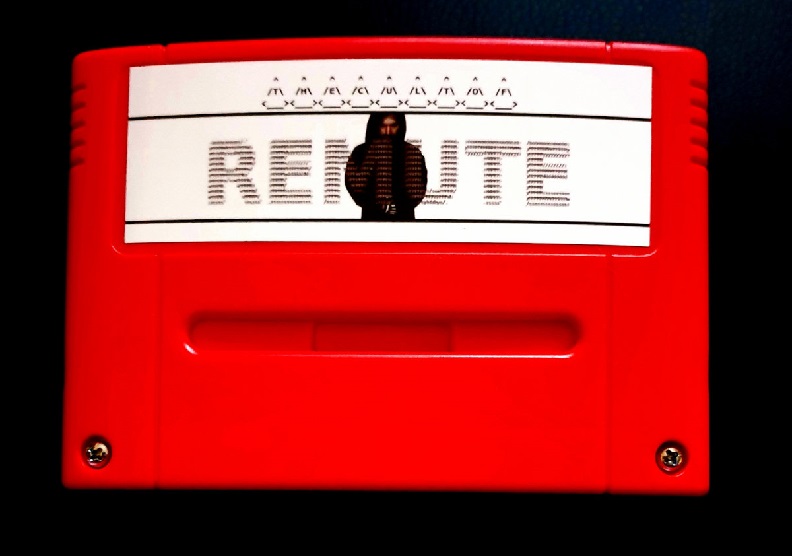
The 16bit era of game consoles is my favorite gaming era. Besides the timeless pixel graphics, I’m still fascinated by the fact that every game console had an individual and very distinctive sound. The Super Nintendo, for example, tried hard to sound „realistic“ with its rudimentary sampling capabilities, but failed miserably and still comes across as uniquely great. This uniqueness in sound was the main motivation for me to make an album for the SNES!
Is it worth releasing albums on retro game modules?
There are still many SNES fans around the world. ; )
How does the conversion of the albums to the retro game modules work? I imagine it’s very time-consuming, after all, you’re not only doing it for Super Nintendo, but also Game Boy and Nintendo DS, Floppy Disk, Mega Drive and well, CD and vinyl.
The conversion for game modules is indeed a tricky matter: Especially the SNES has a very limited sound chip with little RAM (SPC700). Therefore, as a musician, I have to concentrate on the absolute essence of a song and leave out everything unnecessary – I’m practically forced to do this by the limitations! If the limitations are still annoying at the beginning, it becomes an absolute creativity booster at some point! It is helpful, however, that the sound chips of the retro consoles work with music generated in real time, which takes up very little space. Thus, a sheet of music is read in from the sound chip at every turn, and a small electronic orchestra in the chip plays the music live.
What do you use to create your music?
For the module albums I use different trackers. For example, the SNES album was created using OpenMPT – a program that handles multiple tracker formats and can communicate well with the SNES sound chip. The new Game Boy album, on the other hand, was created with a heavily modified version of the good old LSDj tracker… All module albums are always a new technical adventure, which sometimes makes me despair, but in the end makes me happy.
Adapting your songs to the sound of a Game Boy or SNES module is surely a huge amount of extra work, isn’t it? How does Remute implement something like that?
The process of making music is definitely very different from „traditional“ music making for CDs, vinyl or streaming. I don’t record my music, I write it – or rather, program it. This „program code“ is very compact in terms of memory size – so my SNES album (The Cult of Remute) fits into the sparse 1 MB of the module. The sound chip then plays this music in real time and so the sound quality is high despite the small memory size. All my module albums work according to this principle – i.e. for Mega Drive, SNES, PC Engine and now Game Boy. It was refreshing that after years of working as a musician, I finally reinvented myself as a „music programmer“. So to speak Remute 2.0.
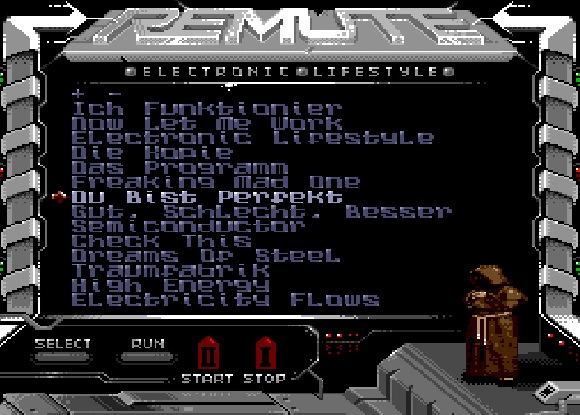
Do you often have to compromise because a song you’ve implemented doesn’t translate appropriately in terms of sound or rhythm on retro consoles?
To say the least, I am constantly forced to rethink! But through this I learn to solve „problems“, deal even more intensively with a song idea and then actually implement it quite uncompromisingly in the end.
Will you be releasing your albums on retrogame modules more often in the future or is that it for now? If so, for which system?
The adventure never ends! Currently my new album „Living Electronics“ for the Game Boy is in the pipeline. This will be followed by another system at the end of the year – let me surprise you.
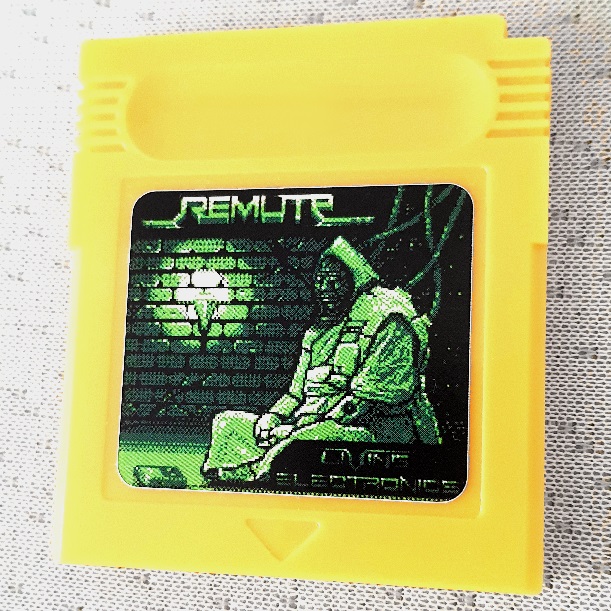
You said to me your SNES album is currently sold out and would probably be available again towards the end of the year … but I found a seller from the USA – on ebay, who sells a lot of your albums as SNES and SEGA modules. Does he sell fakes?
For the end of the year there might be an official re-release. The seller from the USA is (probably) Stone Age Gamer – a store I have been cooperating with officially for a long time, mainly for the US market. It may be that there are still some quantities available – but of course it’s not really attractive for customers outside the USA due to horrendous import costs…
Is „The Cult of Remute“ also playable on Japanese Super Nintendos, i.e. Super Famicoms?
Yes, the module runs on all region models of the SNES. This is realized by a special chip, which elegantly bypasses the region lock.
Do you already have a specific date for the next edition of The Cult of Remute? Or a concrete date for the following album?
My guess is the end of the year, but I can’t give an exact date at the moment, sorry.
Do you also have gigs with your music? Well, apart from the fact that the gig situation is a bit difficult at the moment.
Of course, the pandemic has almost completely interrupted my tour calendar of the last months. Nevertheless, I had some „pandemic-compliant“ but still great gigs, e.g. at the terrific Home Computer Museum in the Netherlands – that was really special to perform surrounded by, literally, 50 years of computer history! For the future I remain optimistic, hope for relaxation of the situation and definitely plan more gigs in „extraordinary“ locations!
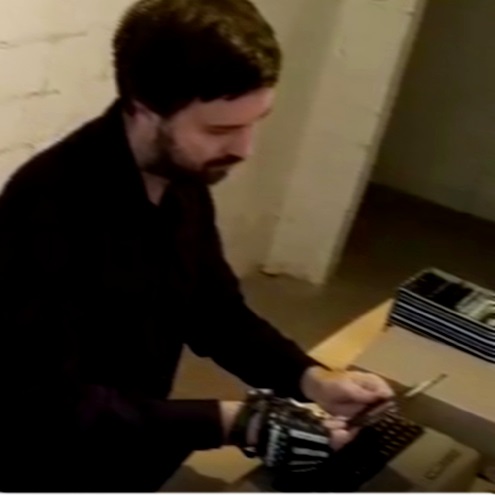
Who is the Russian band Remute that you can find on youtube? Did they cover your music or do you write their songs?
The Russian band Remute has nothing to do with me. So I am quite familiar with the case. My stage name is officially protected and I don’t like it, to say the least, that a band simply has the same name, but unfortunately I can’t take action against it because of the „complicated“ international legal situation. But fortunately the guys are musically quite far away from me.
What do you generally like to play in terms gaming?
I am indeed a retro gamer through and through and also have a large collection of modules and PC and Amiga big boxes. I’m definitely into the 16bit era and currently catching up on some RPGs like Chrono Trigger, Star Ocean or Earthbound. Generally I like extensive adventure games on the one hand, but on the other hand I also like entertaining arcade action in the form of beat em ups or shmups, a la Streets Of Rage, Samurai Showdown or Thunder Force. New games for old consoles, like Paprium for the Mega Drive, I also find very appealing! But also the current console and PC game generation is not strange to me: but here I rather like the weird obscure games like e.g. Hypnospace Enforcer by Jay Tholen, the new Leisure Suit Larry Adventures or some Japanese RPG stuff. You can chase me with so called AAA-titles, so no chance for FIFA, Call Of Duty and Co. but a good round of Doom Eternal is ok. : )
What were or are your favorite games for the Super Nintendo?
The Super Nintendo has a very high-quality library, so it’s hard to name favorites. But if I have to choose, I’d have to say adventure and RPG games: Zelda, Final Fantasy, Secret Of Mana, Terranigma, Secret of Evermore – many of them I still like to play or catch up on.
Which games have influenced you musically? And how exactly did they do this?
On the Super Nintendo, various adventure games and RPGs influenced and shaped me the most musically. Games like Zelda or Final Fantasy tried to have realistic sounding orchestral sounds, but ended up sounding very artificial – so just right for diving deep into artificial worlds! On the Mega Drive, it’s games like Streets Of Rage or Robocop Vs Terminator that really appealed to me with their cyberpunk techno sound…
What is your favorite SNES game soundtrack?
From today’s perspective, I would have to go with Earthbound. Incredibly varied, great weird ideas and also technically wonderfully polished!
Do you know the game X-Caliber 2097? It has a really cool techno soundtrack made by Psykosonic.
I actually didn’t know it yet, but it’s really my cup of tea! It breathes the spirit of early 90s rave in every single sound! (Thanks for sharing!)
Speaking of really cool sound, what would an interview with a musician be if we didn’t also bring you a little closer to his music? Time for an intermezzo:
Have you tried your hand at creating games for retro consoles?Generally I have only a few MB available for my albums: the SNES album has 1 MB, as well as my PC Engine album. The Mega Drive album had 4 MB and my upcoming Game Boy album has 2 MB, which is a lot for a Game Boy module…
Have you tried your hand at creating games for retro consoles?
Not yet. But I wouldn’t exclude it.
For which system was it most difficult to realize your music and which was easiest and why?
The music for my upcoming Game Boy album was definitely the most difficult adventure yet. Since I like to incorporate samples, it was incredibly difficult to work with the limitations of the Game Boy sound chip – I literally broke a sweat. I can’t believe myself that it now sounds so easy-going and „happy“. 🙂 The SNES album was the easiest for me, because I was able to work with a tracker format that I already knew from my early musical attempts on the Amiga and PC – but even here there were critical moments, where I despaired of the 64 kilobyte small audio RAM of the SNES…
How does the conversion of voice samples work? I imagine it’s like making an audio recording and then converting it down virtually endlessly – but when I did that once, the result were creepy sounds that had nothing to do with my recording.
The description already sums it up quite well. The voice samples on my SNES album were first recorded in the classic way using various music tools and synths (e.g. a Roland vocoder or various Eventide effects) and then down-converted into a suitable tracker format. The special thing about the SNES sound chip, however, is that even very brutally compressed and short samples still sound quite good in the end, because a special algorithm and especially the echo DSP effect, breathe a big pinch of life and dynamics into the whole thing.
Where do you get the inspiration for your songs? Is it simply a rhythm that sticks or do you have a concrete scenario in mind that you want to accompany musically?
Having literally grown up surrounded by and with computers, I always like to say that electronic music is the singer/songwriter expression of computer geeks. My music has a basically technoptimistic message and I am very good friends with the machines.
Ever thought about teaming up with someone who creates retro games to provide the soundtrack for them?
I’m currently working on a couple of game soundtracks in parallel – at least one of which is very retro. But of course, the connection between my music and games feels super-pleasant and natural to me…
How did the Corona crisis affect Remute’s musical work?
The creative process and my activity as a „music programmer“ remained largely unaffected, because even before the crisis it was a very introverted affair, which takes place quite deep and isolated from the outside world in my head. But of course the almost complete absence of concerts or parties has led to one or the other musical idea becoming even more heady and less „dancefloor“ – whether this is good or bad now, the listeners have to decide.
Thanks and additional information
Yes, many thanks to Remute for the really good and rather unusual interview. Thanks for the insights into a sphere of which I never thought to gain insight. I wish Remute absolutely everything good with his music and his grandiose ideas and that these find hearing and interest. See you soon and you may read my test of the SNES album The Cult of Remute sometime soon 😉
Additional links:

